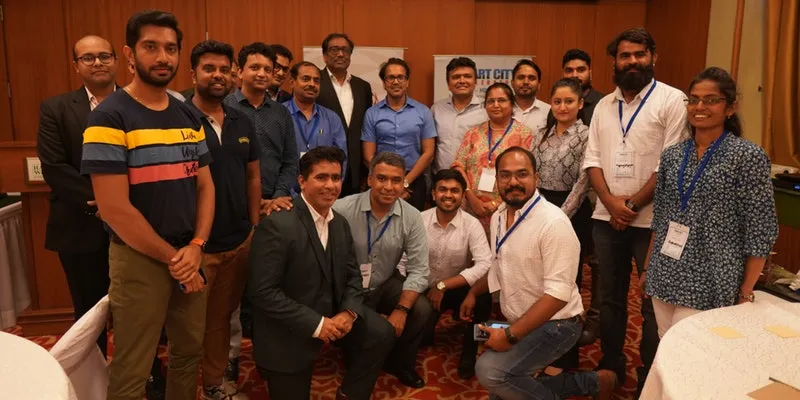[Startup Bharat] Ashoka University’s accelerator programme AIMs to bolster startup growth in Tier II and III cities
AIM Smart City Accelerator’s 20-week programme aims to nurture innovative early-stage startups from Tier II and III cities with unique solutions, focused on building a smarter and sustainable India.
The Indian startup ecosystem has a plethora of startup accelerators that act as catalysts to upcoming startups in their product-building and growth stages. Typically, these accelerators offer mentorship and support in terms of infrastructure, product design, access to professional network, office space, go-to-market strategy, access to potential sales, and fundraising, etc.
Some of the well-known accelerators from India today include 500startups, Cisco Launchpad, GSF Accelerator, Google Launchpad, and Amity technology incubator.
AIM Smart city Accelerator, born out of Ashoka University in Sonipat, Haryana, in 2016, was launched to empower startups primarily working on three issues - healthcare, sanitation, and waste management. However, like regular accelerators, it offers the same mentorship and support to startups from Tier II and III cities in India.

The team at AIM Smart City Accelerator
Claiming to be the country’s first dedicated smart city accelerator, AIM’s first cohort was released in 2016, and started out initially with two other partners - ISB Hyderabad and Microsoft.
Speaking to YourStory, Ekanto Ghosh, Manager at AIM, says,
"The focus area at AIM is very narrow and is only within smart cities. The value proposition and the model need not necessarily be around technology, but can revolve around products and sustainability."
How does it work?
To begin with, startups submit a written application and get their decks showcased in front of a jury, after which they are shortlisted. They are then made to get acquainted with subjects to build inclusive enterprises, design thinking, and value proposition.
The process begins with the formal Cohort inauguration, followed by going through a learning lab. These learning labs are custom-designed to suit the requirements of the cohort startups, and help them achieve scale.
Ekanto says, "An important aspect of our programme is dedicated mentoring and disciplined follow-ups. We also strive to provide deep industry and sector-specific connects to help our cohort startups move towards growth."
The mentors at the centre are said to be experts in smart cities, their planning, and development. While the duration of the programme is 20 weeks, the shortlisted startups are required to participate in compulsory contact classes conducted by the AIM team.
The participants get to interact with the mentors to get help in troubleshooting their own challenges, seek different ideas, and ensure growth. It also holds sessions based on business operations - including unit economics, financial modelling, pitching, and investment funding.
Apart from providing industry connects to the startups, AIM also provides access for go-to-market through its dedicated network, support in strategy and product design, and access to government connects and investments.
The eligibility criteria for AIM Smart City Accelerator is that startups should have a minimum viable product (MVP) and working business model ready, and should be solving any of the three issues - healthcare, sanitation, and waste management. However, there is no restriction for Tier I startups to apply for it either.
Partnerships
While AIM initially started out by partnering with ISB Hyderabad and Microsoft, who are now partner accelerators in their own capacity, the entire show now runs out of Ashoka University.
The cohorts for 2016 and 2017 were sponsored by the Dalmia group, and 2018 and 2019 cohorts are sponsored by Holistik, the hologram sticker manufacturer. It comes under corporate social responsibility (CSR) for the sponsors.
At present, the smart classes are facilitated by popular names from the startup ecosystem like Dr Anu Gupta, Co-founder of Kyt Ventures and an angel investor; Divya Tiwaari, CEO of Sahaas; Deep Bajaj, CEO at PeeBuddy; Sanjiv Bhatia, President at Stenum Asia; Vishal Bansal, CEO of Healthstart Accelerator; Nupur Tandon, founding director of Prowaste Concepts; Abhishek Dwivedi, AVP Growth at 1mg, and Deeksha Gahlot, Managing Counsel at LexIngenious.
The organising team now has four members and an external consultant. Ekanto says there is no restraint whatsoever in the selection process if at all two startups that are in competition apply.
"We will evaluate them based on their idea, team, and the stage of operations they are in, along with an analysis of whether the market size is large enough for them to compete," he says.
Some of the graduates of the 2016 cohort are Gudgudee, Exchange4solar, Khetify, Pumpcharge, Kontext, Smartclinics, Ajeevi, and Truckerrs. The graduates of the 2017 cohort are Sukriti social foundation, Ecomitram, Smartify Health, Docturnal, UtopiaTech, Yspot, Tech for Impact, and Fedo. In 2018, Basicshit, Bioman, Padcare Labs, Wowlet, Smartclean Technologies, RaddiConnect, Greenworms, and MedSamaan graduated.
While Calicut (Kerala)-based Freshcut organic products deals with slaughterhouse waste management and up-cycling to pet feed, Jodhpur-based Krimanshi technologies facilitates the up-cycling of farm and agri waste to dairy feed.
The other startups in this cohort are REVY Environmental Solutions, Loopworm, Ecowrap, Scraptap, Stonesoup, Watsan Envirotech, Incredible devices, Dial4242, DOCOPD, and AB Hospitals.
(Edited by Megha Reddy)


![[Startup Bharat] Ashoka University’s accelerator programme AIMs to bolster startup growth in Tier II and III cities](https://images.yourstory.com/cs/2/730b50702d6c11e9aa979329348d4c3e/Imagezjx91574963348159jpg?mode=crop&crop=faces&ar=2%3A1&format=auto&w=1920&q=75)
![[Startup Bharat] How Patna-based edtech startup Cymatic is democratising education in Tier II and III India](https://images.yourstory.com/cs/2/3fb20ae02dc911e9af58c17e6cc3d915/startup1574336340650png?fm=png&auto=format&h=100&w=100&crop=entropy&fit=crop)

![[Startup Bharat] These Kerala-based engineers help clients extract data at scale from the internet](https://images.yourstory.com/cs/2/79900dd0d91311e8a16045a90309d734/foundersdatahut1573741170763JPG?fm=png&auto=format&h=100&w=100&crop=entropy&fit=crop)




